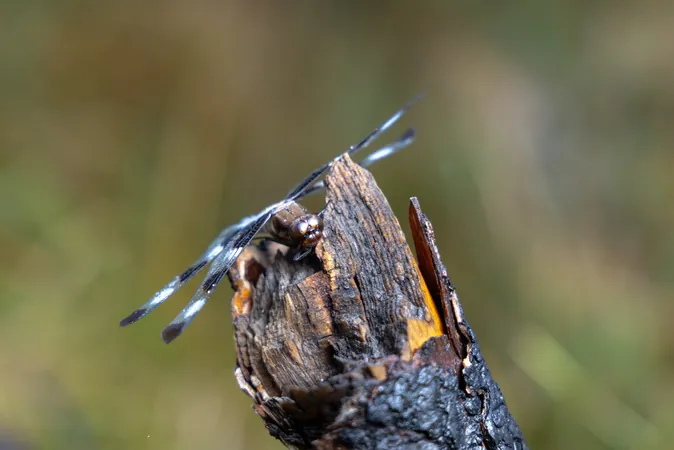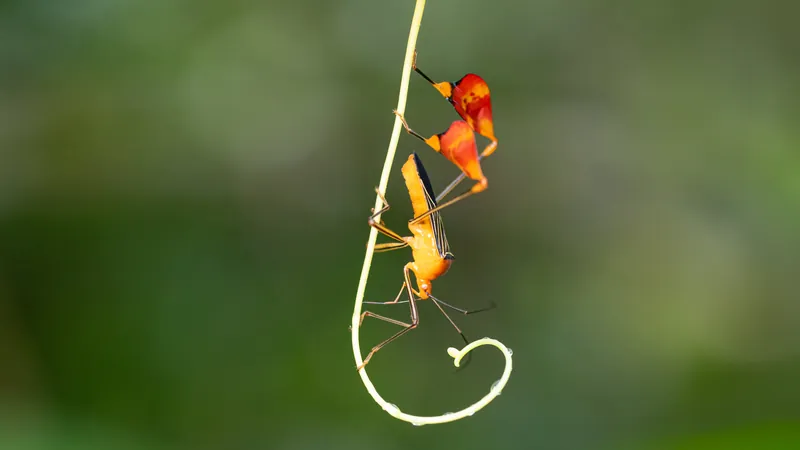
Dragonflies May Face Extinction Due to Climate Change and Wildfires
2025-09-10
Author: Yu
The Threat to Dragonflies: A New Study Reveals Shocking Findings
A groundbreaking study from the University of Colorado Denver has unveiled a grim new reality for dragonflies: climate change and escalating wildfires are endangering their mating traits, potentially leading certain species toward extinction.
Published in the prestigious journal Nature Climate Change, the research suggests that dragonflies with distinct dark wing spots—traits traditionally used to attract mates—are becoming increasingly vulnerable in a world growing warmer by the day. These captivating insects are vital to our ecosystems, acting as key predators of mosquitoes and serving as an essential food source for birds, fish, and amphibians. A decline in dragonfly numbers could send shockwaves through entire food webs.
Lead author Sarah Nalley, a Ph.D. candidate in CU Denver's Integrative Biology program, poignantly remarked, "Dragonflies have survived asteroids, but now climate change and wildfires are threatening them in ways evolution can't keep up with. Our findings indicate that adaptation alone may not be sufficient to safeguard these species in our rapidly shifting climate.”
How Heat Impacts Mating Dynamics
Drawing on four decades of public data, the study discovered that these well-adorned dragonflies are vanishing from areas affected by wildfires and in increasingly hotter locations across the United States. Using thermal imaging, researchers identified that the dark melanin spots on their wings absorb heat more quickly, putting male dragonflies at risk of overheating.
Consequently, these males find themselves spending more time resting to recuperate rather than competing for their mates. Unlike the well-known case of the peppered moths during the Industrial Revolution, where wing color aided in predator evasion, for dragonflies, it’s their wing color that plays a crucial role in reproductive success. This indicates that survival alone doesn't tell the entire tale; shifts in mating behaviors could contribute to population declines.
A Personal Connection to Conservation
This eye-opening study originated as a class project in Professor Michael Moore's course and utilized exclusively publicly accessible data sources, including U.S. Geological Survey records, citizen science contributions, and federal climate databases.
For Nalley, however, the research holds deep personal significance. After losing her home in the devastating 2021 Marshall Fire in Superior, Colorado, she realized her passion for wildlife could be intertwined with her desire to understand the impacts of wildfires on ecosystems.
"I recognized I wanted to focus my studies on animals—and after that fire, it was clear I also wanted to investigate wildfires," Nakley shared, emphasizing her desire to understand how these disasters affect not just survival but also reproduction and the future of species.
The Implications for Biodiversity
The importance of this research extends beyond dragonflies; it highlights broader implications for biodiversity and conservation efforts. If even these resilient predators, which have thrived for hundreds of millions of years, are finding themselves at risk, the stability of countless other species hangs in the balance.
This study calls for an urgent rethinking of wildlife management strategies, emphasizing the necessity to consider not just survival rates but also mating behaviors and reproductive success as vital components of conservation.
In Moore's words, "Working with Sarah has challenged me to approach ecological research in a fresh, insightful way, reshaping our understanding of wildfires and their impact on reproduction.”






 Brasil (PT)
Brasil (PT)
 Canada (EN)
Canada (EN)
 Chile (ES)
Chile (ES)
 Česko (CS)
Česko (CS)
 대한민국 (KO)
대한민국 (KO)
 España (ES)
España (ES)
 France (FR)
France (FR)
 Hong Kong (EN)
Hong Kong (EN)
 Italia (IT)
Italia (IT)
 日本 (JA)
日本 (JA)
 Magyarország (HU)
Magyarország (HU)
 Norge (NO)
Norge (NO)
 Polska (PL)
Polska (PL)
 Schweiz (DE)
Schweiz (DE)
 Singapore (EN)
Singapore (EN)
 Sverige (SV)
Sverige (SV)
 Suomi (FI)
Suomi (FI)
 Türkiye (TR)
Türkiye (TR)
 الإمارات العربية المتحدة (AR)
الإمارات العربية المتحدة (AR)